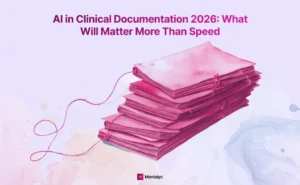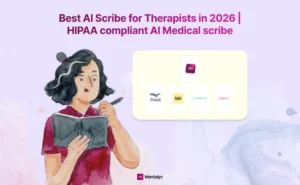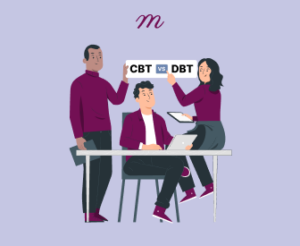Being a therapist can be a costly expense. If you’re a mental health professional, you may have to spend hundreds of dollars yearly to buy resources, renew your license, and find continuing education to keep your license. The money could add up quickly depending on how much continuing education your state requires.
If you’re obtaining your continuing education credits by training in modalities such as Eye Movement Desensitization and Reprocessing Therapy (EMDR) or Internal Family Systems, these modalities and methods can cost thousands of dollars. That’s not to say that training and learning new modalities can’t be beneficial, but if you’re a therapist on a budget, there are cheaper and even free ways to gain more education in the field.
When seeking out new educational opportunities, it’s essential that you’re aware of what you need to maintain professional licensure. While there are some free and low-cost opportunities available, not all courses will meet your state-specific requirements.
What is Continuing Education, and Why do I need to do it?
Continuing education requires professional growth in many fields, such as counseling, psychology, and social work. Many mental health professionals seek continuing education to learn new skills, work with a specific population, or try a new modality.
It can be challenging to continue to help clients grow in a therapy session if the therapist isn’t learning and growing and staying up-to-date with new developments in the field. Adjusting to the times is hard without continuing education and may leave you stuck in the past.
You may also be doing your client’s a disservice if you aren’t well-trained in the areas they bring to therapy. If you aren’t educated in a particular issue and are working with a population or a clinical presentation you aren’t used to, continuing to treat a client may be outside your scope of practice.
Continuing education, consultation, and sometimes supervision are necessary to thrive in the field. You aren’t going to be prepared for every clinical issue you encounter. Still, continuing education can help you develop the skills and tools you need to provide quality care to your clients.
Continuing Education and Requirements
When seeking continuing education, you want to be sure that your licensing board accepts the credits you desire. The number of hours also is profession and state-dependent. For example, Missouri requires 40 continuing education credits every two years; only 20 of those hours can be self-study activities, and the other 20 must be formal education credits.
Some professional organizations that approve CE credits include:
- The National Board of Certified Counselors (NBCC)
- The American Psychological Association (APA)
- Association of Social Work Boards (ASWB)
- The American Association for Marriage and Family Therapy (AAMFT)
- The American Counseling Association (ACA)
- The American Medical Association (AMA)
You must be familiar with your jurisdiction’s criteria for meeting your continuing education obligations.
Where can I find free or low-cost Continuing Education?
There are a variety of resources out there for therapists who are looking for free continuing education. When you know where to look, you don’t have to empty your wallet to get your requirements in. Here are some CE providers that offer free or low-cost courses. Before using any of these providers, please verify with your state licensing board requirements that they will count.
Clearly Clinical
Clearly Clinical is a woman-owned continuing education provider that offers credits in the form of podcasts. They offer a membership for $95 per year to get unlimited continuing education courses, which is cheaper than many providers.
One benefit of Clearly Clinical is that they offer seven free continuing education podcasts without purchasing a membership. The free podcasts are informative and affirming of diverse populations. All you have to do is sign-up for the free podcasts and pass a quiz at the end to obtain continuing education credit.
CE4Less
CE4Less offers unlimited subscriptions at a low rate of $75 yearly to obtain your continuing education credits. Some courses start as low as ten dollars per course. They also help you keep track of your continuing education certificates that you complete through their organization. Right now, they offer a course titled “Ethics and Boundary Issues,” which is free and worth five credit hours!
Therapy Trainings
If you’ve graduated in a mental health field in the last six months, Therapy Trainings offers a full year of free continuing education credits to help you develop and improve your skills. If you’re not a new graduate, they offer a three-credit course on Avoiding Burnout that is completely free when you sign up with your e-mail.
American Psychological Association CE Corner
If you’re a Psychologist member of the American Psychological Association (APA), you can sign up to get five free CE credits for reading the APA CE Corner article series. If you have an APA membership, you find the article that interests you, take a test and receive a CE certificate.
Quantum Units Education
Quantum Units Education also offers a discounted membership package with unlimited continuing education credits for the whole year. At just $74.95 for unlimited credits, with over 200 courses available, you’re bound to find a course that interests you.
The Integrative Psychiatry Institute
The Integrative Psychiatry Institute offers 25 CE credits for free when you sign up for their “Future of Psychotherapy” course bundle. These are free videos to watch online and are approved by the National Board of Certified Counselors (NBCC).
American Counseling Association (ACA)
If you’re a member of the American Counseling Association (ACA), they offer one free continuing education credit each month. If you’re in a two-year cycle for continuing education credits, you can obtain over half of your CE’s for free by being an ACA member.
The American Association for Marriage and Family Therapy (AAMFT)
The AAMFT offers online courses that are low-cost and accessible. They have an online continuing education system called Teneo. You can access courses for just $15-25 if you’re a member. They have many classes you can choose from to obtain continuing education.
What if I want to get trained in an expensive modality, and I can’t afford it?
I’ve been there; Eye Movement Desensitization and Reprocessing Therapy (EMDR) and Accelerated Resolution Therapy (ART) have been on my personal list for a long time. Some modalities and ways to educate yourself in the field aren’t cheap. If you want to obtain EMDR training, it often costs $1500 and up.
If you do want to gain education in a higher-priced modality or attend expensive training, here are a few things you can do:
- Check with your state board or state-specific programs to see if they offer any discounts or free training
- Check with any professional organizations that may provide discounted training
- Seek out training that offers a payment plan option
- Contact the organizer of the program to see if they are willing to customize payment options
These are all ways you could potentially save money on beneficial continuing education.
Benefits of continuing education
Continuing education can benefit mental health professionals in a variety of ways. It can help you stay updated on various developments in the field. You can learn new skills or modalities to implement in your work with clients.
Research on Psychologists, in particular, emphasized the role that Psychologists have to be lifelong learners. The authors suggest that becoming a lifelong learner involves humility and can help you learn critical thinking skills to help minimize biases. You can become more competent in your professional skills with continuing education. Lifelong learning and humility can be applied to many fields within mental health.
Continuing education can also help you expand your professional network. If you attend in-person or online continuing education events, you can meet other mental health professionals who are also working to improve their skills. You can also make new friends and gain potential referral sources.
You can also gain continuing education by learning from other professionals in consultation groups or supervision. These settings can help you view client problems with a fresh perspective or point you to resources that can help.
The Bottom Line:
The listed organizations provide free or low-cost continuing education, an expense many mental health clinicians must endure to maintain licensure. Finding low-cost or free continuing education credits doesn’t have to be complicated or time-consuming. You can find some training at the organizations listed above.
If you’re looking for more ways to obtain continuing education, you often can find upcoming training by utilizing your professional networks or staying up to date with any professional organizations you belong to. Networking with other therapists and being a part of groups on social media may help you find training in your areas of interest.
If you’re considering attending continuing education training, it’s important to note whether these are acceptable to your state licensing board. Each state has different requirements and credits you need to maintain licensure.
Overall, continuing education provides various benefits for mental health professionals. Learning new skills, meeting new people, and learning how to approach therapy with clients can help you become a better clinician.
Resources:
- Washburn J, et al. (2022). The Central Role of Lifelong Learning and Cultural Humility in Clinical Psychology. https://journals.sagepub.com/doi/10.1177/21677026221101063
Why other mental health professionals love Mentalyc

“It immediately changed my quality of life, personally and professionally.”
Owner/Independently Licensed Marriage & Family Therapist (LMFT)

“Do yourself a favor, make your life easier. I found Mentalyc to be one of the best tools that I’ve ever used.”
Licensed Marriage and Family Therapist

“For anyone hesitant: this is a lifesaver. It will change your life, and you have more time to be present with your patients.”
Licensed Clinical Social Worker

“If I were recommending this software to a colleague, I would tell them that it is the best thing that they could do for their practice.”
Licensed Professional Counselor






